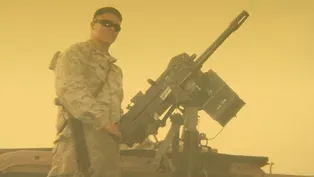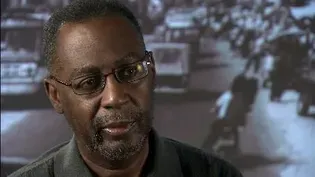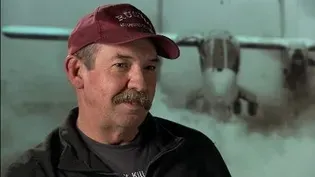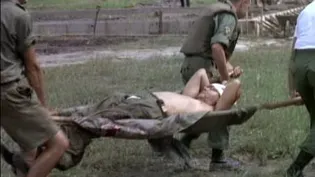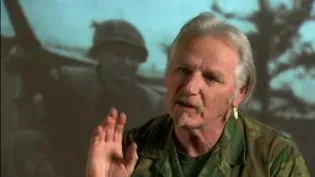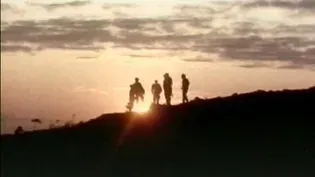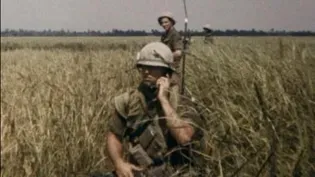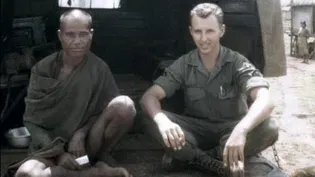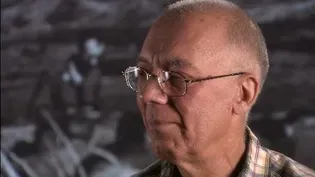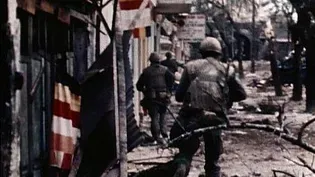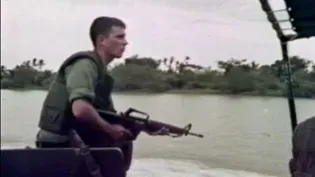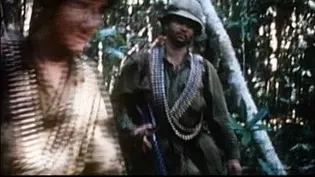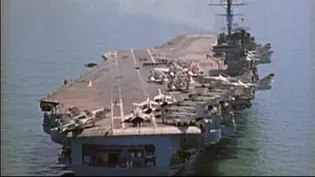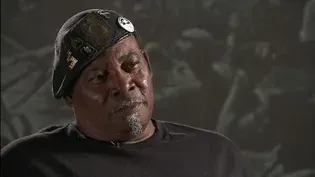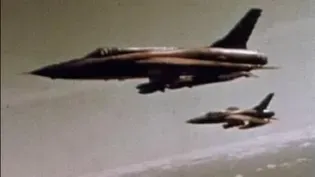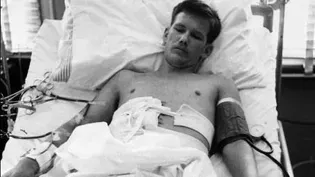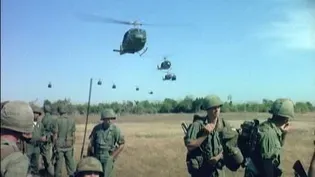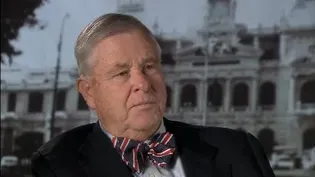
Vietnam: Turning Point - Brown Water Navy
Clip | 8m 12sVideo has Closed Captions
River-based Army and Navy veterans describe facing enemy attacks and Agent Orange.
Mobile Riverine Force Both Army and Navy men provided drop-off to heavily infested enemy areas and medical evacuations of injured soldiers, as well as interception of enemy supplies. On these watercrafts, veterans describe being faced with enemy attacks and exposure to Agent Orange. (Part 6/7)
Problems with Closed Captions? Closed Captioning Feedback
Problems with Closed Captions? Closed Captioning Feedback
Wisconsin War Stories is a local public television program presented by PBS Wisconsin
Thanks to lead gifts from Don and Roxanne Weber, Associated Bank, Ho Chunk Nation and the Lynde and Harry Bradley Foundation.

Vietnam: Turning Point - Brown Water Navy
Clip | 8m 12sVideo has Closed Captions
Mobile Riverine Force Both Army and Navy men provided drop-off to heavily infested enemy areas and medical evacuations of injured soldiers, as well as interception of enemy supplies. On these watercrafts, veterans describe being faced with enemy attacks and exposure to Agent Orange. (Part 6/7)
Problems with Closed Captions? Closed Captioning Feedback
How to Watch Wisconsin War Stories
Wisconsin War Stories is available to stream on pbs.org and the free PBS App, available on iPhone, Apple TV, Android TV, Android smartphones, Amazon Fire TV, Amazon Fire Tablet, Roku, Samsung Smart TV, and Vizio.
[gentle guitar music] - Michael Hoks: I was the first one to put my hand up when they asked for volunteers for Vietnam.
We were the first river division over there, which was something I didn't hear of, and apparently that's what I volunteered for.
In World War II, most people remember the boats going up on the beach, dropping a ramp, and the Army guys running off.
That's exactly what we were on.
However, this boat was totally refitted.
It was our job to get the Army where we knew there was heavy concentration of North Vietnamese.
And then we would go in and drop 'em off, give 'em gun support, medical evacuation, complete evacuation when the operation was over or if something went wrong.
- Bruce Jensen: The boats that I was on, we went up some rivers that were-- the boats were longer than the river was wide, and we had to pull up onto the beach and back down just to turn around.
But my boat, being equipped with a helicopter pad, we were the medical aid boat for the division.
My job, when we brought in the helicopters, I'd have to get out of my gun mount, go up, and I'd stand on the corner of the flight deck and wave the pilot in to set down.
He couldn't actually see because the nose of the helicopter was over the edge.
- Mike Demske: I got orders for swift boats.
The delta area where I was stationed, there was no highways.
To get from village to village, you had to go by boat, and we were supposed to patrol and prevent any infiltration of supplies, medical supplies, food, ammunition to the VC.
They would try and sneak it in via the ocean, and our job was to stop that.
And then Admiral Zumwalt took over as head of the Navy in Vietnam, and we became river runners.
- Ken McGwin: Went to the Westchester County.
We had about 120 in the ship's company.
The LSTs had that unusual mission, you know, of being able to navigate the waters of the Mekong far up into the delta, where, you know, other Navy ships could not go.
The armored gunboats, the tangos, would tie up alongside the LST, refuel, meals, try to repair, and at night they would circle, drop grenades in the water, you know, to try to keep the Viet Cong from being able to swim out there and do damage with mines or, you know, explosive charges.
- We helped each other.
It wasn't Army, Navy.
It was Riverine Force.
If the Army was still on the boats, they'd get their guns out there, and one side or the other side, sometimes both sides of the boat, we had shooting.
We worked together with them very, very closely.
I have a high regard for the 9th Infantry, because at a top speed of less than 10 miles an hour, we had to fight our way out of any situation.
- Very few missions that we went on did we go in and out without receiving fire.
One time, something out of the corner of my eye just caught my attention.
I look up, and here was a mortar shell going up.
You know, I was just mesmerized by it.
And then it started coming down, and then it dawned on me exactly what was going on.
I thought, "Oh, hell."
[chuckles] I ran and I dove.
I went right through the opening of the gun mount, whoosh, and back up, firing away.
[chuckles] Once you started running the rivers, invariably you were going to get ambushed someplace.
For a while there, I think 75% of the people that were on the boats were killed or wounded.
Everybody on my crew was wounded at least twice.
I mean, the jungle was right up to the riverbanks, and that's when Admiral Zumwalt ordered the use of Agent Orange.
After they had sprayed it, you swore you were on the moon.
There was nothing alive.
It was just incredible.
But it did move the VC back further.
Early morning hours, two tremendous explosions, and they had managed to get out there, frogmen, fastened charges on both sides of the ship.
The worst damage of any Navy ship in the war.
Many, many people dead, many, many people hurt, and it was just trying to find 'em and get the ones that were alive out of there if we could.
We couldn't use torches to cut people out because of the diesel fuel, and it was vaporized in the air.
We're just choking.
You know, you could hear people struggling to get out.
They died, I suppose.
We just couldn't get to 'em in time.
Everybody fought back with everything they had, and it was a hard thing to do.
- We'd drop 'em off at first light, help 'em off the boat, and then we would just stay in the area.
And when they confronted any enemy action, they would radio back to us, and if we could help with the machine guns or the mortars, that was our immediate duty.
Otherwise, they'd give us coordinates, and we would have the howitzers or the flyboys come in.
Then there were times where the Viet Cong resistance was bigger than what we expected, and they knew they could not cross the river because of the boats.
Then they would fight back through the Army, and it was always a very depressing day when you knew that you were supposed to pick up 40 guys and only 20 show up.
Being the medical aid boat, we had it somewhat cushy compared to the rest, but we still had our firefights, and we got to deal with the wounded.
Some of it bad, but we were part of getting 'em out and getting 'em to safety.
I mean, I've seen enough blood and gore to last me a lifetime.
- I remember talking to Admiral Zumwalt at one of our reunions, and his son was on Swift Boats, and he ended up dying from cancer from exposure to Agent Orange.
And he said if he had to do it all over again, he'd still do it 'cause it gave us 30 more years to live, even though a lot of us suffer from exposure to it.
We were young and dumb, and we didn't know what the effects would be of it.
I don't think the Navy knew what they were.
We would tie our clothes on a rope and throw 'em in the prop wash when we were running 'cause it's the only way we had of cleaning our clothes, and here the river was full of Agent Orange, and the riverbanks were, and it just-- we didn't know it.
All of my memories of Vietnam just focused right back on that one night.
And I had thought that when I got older, it wouldn't bother me anymore, but it does.
It gets worse, and no matter how hard I try, I can't shake that guilt.
I've had the chance to have a good life, and they never did.
They never had a chance.
Video has Closed Captions
OIF Army veteran Crystal hits the road to find her way home to an organic farm. (5m 20s)
Video has Closed Captions
Vietnam War veterans help today's veterans cope with the invisible scars of combat. (30s)
Vietnam: Draw Down - Rear Echelon
Video has Closed Captions
Veterans assigned to support jobs in the military describe life on and off duty. (7m 40s)
Vietnam: Draw Down - Hamburger Hill
Video has Closed Captions
Veterans recall the haunting memories of a battle they waged for many days. (6m 49s)
Vietnam: Draw Down - Firepower
Video has Closed Captions
Air Force veterans recount dangerous missions targeting the North Vietnamese Army. (8m 1s)
Vietnam: Draw Down - Broken Bodies
Video has Closed Captions
Wounded veterans and hospital staff describe field hospital scenes and returning home. (7m 17s)
Vietnam: Turning Point - Walking Point
Video has Closed Captions
Veterans describe the dangers and responsibilities of walking point. (6m 56s)
Vietnam: Turning Point - The Price
Video has Closed Captions
Veterans reflect on the staggering casualties in Vietnam, and how they coped. (8m 19s)
Vietnam: Turning Point - TET 1968
Video has Closed Captions
The Tet Offensive shocked both soldiers and the American public. (8m 13s)
Vietnam: Turning Point - Montagnards
Video has Closed Captions
Veterans discuss working with the Montagnards, people indigenous to Vietnam. (6m 57s)
Vietnam: Turning Point - Khe Sanh
One of the bloodiest battles of the Vietnam War took place at Khe Sanh. (7m 36s)
Vietnam: Turning Point - Hue City
Video has Closed Captions
The battle at Hue City highlighted the dire state of the Vietnam War. (6m 47s)
Vietnam: Turning Point - Brown Water Navy
Video has Closed Captions
River-based Army and Navy veterans describe facing enemy attacks and Agent Orange. (8m 12s)
Vietnam: Escalation - Send in the Marines
Video has Closed Captions
Marines describe their arrival in Vietnam and the difficulty of jungle warfare. (8m 7s)
Vietnam: Escalation - Naval Presence
Video has Closed Captions
Navy veterans explain their experiences off shore supporting Special Forces. (7m 16s)
Vietnam: Escalation - Elusive Enemy
Video has Closed Captions
Encounters with underground tunnels and their growing uncertainty in the mission. (8m 2s)
Vietnam: Escalation - Dropping Bombs
The allure, challenges and heartbreaking loss of early air combat in Vietnam. (6m 44s)
Vietnam: Escalation - All Hell Broke Loose
As missions became more dangerous, casualties rose. (8m 48s)
Vietnam: Escalation - Airmobile
Veterans of the helicopter brigades describe experiences of bravery, danger and loss. (7m 54s)
Vietnam: Escalation - Advise and Assist
Explore the early events that set the conflict and United States participation in Vietnam. (6m 6s)
Providing Support for PBS.org
Learn Moreabout PBS online sponsorshipSupport for PBS provided by:
Wisconsin War Stories is a local public television program presented by PBS Wisconsin
Thanks to lead gifts from Don and Roxanne Weber, Associated Bank, Ho Chunk Nation and the Lynde and Harry Bradley Foundation.

